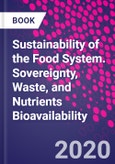Sustainability of the Food System: Sovereignty, Waste, and Nutrients Bioavailability addresses the concept of global sustainability, focusing on three key areas of action within the food production system: food sovereignty, environmentally friendly food processes, and food technologies that increase the bioavailability of bioactive compounds. The book defines key concepts in the food production system and provides examples of specific and tailored actions that contribute to global sustainability.
Sustainability of the Food System: Sovereignty, Waste, and Nutrients Bioavailability will serve as a welcomed resource for food scientists and technologists, agriculturists, agronomic engineers, food engineers, environmental technologists, nutritionists, and post-graduate students studying bioresource technology and sustainability.
Please Note: This is an On Demand product, delivery may take up to 11 working days after payment has been received.
Table of Contents
Part I: Food Sovereignty 1. Traditional varieties with high content in bioactive compounds and functional raw materials for an increased biodiversity 2. Crop and cultivation processes to avoid soil degradation 3. Cultivated varieties and proximity consumption rule to decrease carbon footprint
Part II: Food production and food waste valorization 4. Biofuels from food processing by-products 5. Food industry by-products revalorization and new ingredients: Cases of study 6. Use of by-products in edible films and packaging
Part III: Innovative food technologies and nutrients bioavailability 7. Development of functional foods by traditional food processes 8. Effect of non-thermal technologies on functional food compounds 9. Probiotics and nutrition: use of probiotics to improve antioxidant properties and bioavailability of food compounds
Additional Chapter. Globalization of Technologies: Pros and Cons








